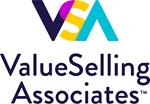CARLSBAD, Calif., March 31, 2023 (GLOBE NEWSWIRE) -- Nearly two-thirds (61%) of sales leaders believe it makes sense to use a buyer-centric sales approach, even if it makes the sales cycle longer. This is because it’s more effective than any other method, according to the just-released ValueSelling Associates, Inc. research findings. More than half (55%) of sellers agree it makes sense to choose a buyer-centric approach, instead of any other, even if it requires more effort.
To find out if sales leaders and sellers are on the same page about what constitutes a buyer-centric approach, ValueSelling Associates and Training Industry conducted a survey of 260 sales leaders and 278 sales representatives across a range of industries and company types. The ValueSelling Associates research-backed e-book, “From Selling to Solving: The Buyer-centric Approach to Sales Success,” explores the concept of buyer-centric sales, what it means to sales leaders and sellers, and examines the discrepancies between the two.
Key study findings include:
- Sales leaders and sellers agree on five points that define a buyer-centric sales approach.
Buyer-centric sales:- Means putting the client’s goals and needs first.
- Includes creating authentic connections between salespeople and clients.
- Requires salespeople to research and prepare insightful questions for client interactions.
- Involves working with prospects to uncover ideas for ideal solutions and then mapping solutions to that vision.
- Necessitates salespeople to have industry expertise and/or experience.
- Differences emerge in how sales leaders and sellers view critical elements of buyer-centric sales. Sales leaders most identified question preparation and prospect research (60%) as the crucial elements. While salespeople focused on the behaviors—and most identified with creating authentic connections between themselves and the prospect (70%).
- Less than half of sales leaders and sellers said their organizations demonstrate a higher mastery of these buyer-centric sales skills than others in their market or industry:
- Asking insightful questions (45% of sales leaders and 48% of sellers)
- Engaging prospects (44% of sales leaders and 49% of sellers)
- Understanding clients’ business and industry (43% of sales leaders and 44% of sellers)
- Differentiating their products or services from the competition (41% of sales leaders and 46% of sellers)
- Matching solutions to clients’ challenges (40% of sales leaders and 45% of sellers)
- Sellers and sales leaders have different opinions on the best ways to engage prospects.
- Sellers tended to focus on connecting with prospective clients on a human level and actively listening to understand their needs and problems.
- Sales leaders tended to focus on the modality of interactions and products, favoring in-person interactions (rather than virtual interactions) and the ability to present detailed product benefits and advantages over the competition.
- Technology doesn’t solve the problems salespeople encounter, according to 69% of all sales leaders and sellers. The root cause of sales engagement issues varies across organizations. Lack of training in using technology is an issue. 85% of organizations that receive training on how to use sales technology say it improves their skills and agility in sales.
- Six best practices sales organizations can use to align with a buyer-centric sales approach:
- Use a common enterprise language to establish a buyer-centric culture
- Create feedback loops
- Address contextual challenges
- Measure and reward buyer-centric behaviors
- Leverage data and analytics
- Provide ongoing sales training and support
“The ValueSelling Framework methodology is a buyer-centric approach,” said Julie Thomas, ValueSelling Associates’ CEO. “A human connection remains at the core of sales, even as remote work has become more common in many industries. Revenue teams must work harder to develop skills across teams, provide them with properly integrated technology and measure the desired selling behaviors.”
About Training Industry, Inc.
Training Industry, Inc. spotlights the latest news, articles, case studies and best practices within the training industry. Training Industry, Inc. research captures the collective wisdom of learning professionals, revealing fresh data on trends and practices in the evolving training market.
For additional information on Training Industry, Inc. visit www.trainingindustry.com.
About ValueSelling Associates, Inc.
ValueSelling Associates, a leading global sales training company, offers a practical methodology for selling on value, not price. The ValueSelling Framework® is a proven formula that simplifies the complex B2B sale, and the Vortex Prospecting™ program provides a repeatable process that increases connections and conversions to the revenue pipeline. Once trained on the ValueSelling method, organizations grow revenue and increase productivity. Since 1991, thousands of professionals around the world have chosen ValueSelling Associates for customized training, reinforcement and coaching to drive sales results. www.valueselling.com
Connect with ValueSelling Associates:
Media Contact:
Maria Doyle
Doyle Strategic Communications
781-964-3536
maria@doylestratcomm.com



